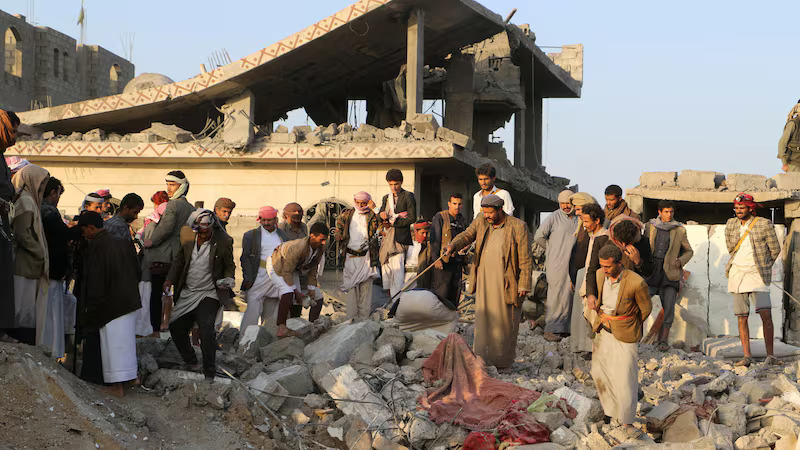Trump’s Houthi Hammer: A Warning to Iran, A Woe for Yemen
The U.S. unleashed a barrage of strikes on Houthi-controlled areas in Yemen late Saturday, a move analysts say doubles as a stern warning to Iran while risking deeper civilian hardship, which the rebels could exploit. President Donald Trump ordered the attacks, vowing “overwhelming lethal force” until the Iran-backed Houthis halt their assaults on Red Sea and Gulf of Aden shipping, the White House confirmed Sunday.
National Security Adviser Michael Waltz told ABC News the strikes “took out multiple Houthi leaders,” adding on Fox News that they delivered a clear message to Iran: “Enough is enough.” The operation, which killed at least 31 people, aligns with Trump’s strategy of maximum pressure on Tehran and its regional proxies, bolstered by heightened sanctions and a push to revive nuclear talks.
“The main target here is Iran—Trump’s showing he could strike them next, negotiating from strength,” Baraa Shiban, a Yemen expert at the Rusi think tank, told The National. He likened the strikes’ intensity to Israel’s campaign against Hezbollah, suggesting a sustained effort to cripple Houthi capabilities. The attacks, launched shortly after the Houthis threatened to resume Red Sea shipping raids over Israel’s Gaza blockade, caught the rebels off guard—unlike the more predictable strikes under President Joe Biden.
“I was stunned by the precision,” said Fatima Alasrar of the Washington Centre for Yemeni Studies. “It shows the U.S. has deep intel on Houthi sites hidden in civilian zones, sending a loud message: We’re watching.” She compared the strikes to Israel’s Hezbollah pager attacks, calling them the decisive response of a superpower unwilling to let proxies dominate the region.
Yet, the cost to Yemen’s civilians looms large. A Sanaa municipality statement urged residents to flee Houthi areas, warning that escalating strikes “will exacerbate Yemeni suffering and thrust the country into broader conflict.” The Houthis’ political bureau vowed retaliation, promising to match escalation with escalation, while local authorities cautioned against opposition groups stoking chaos.
A Yemeni government official, speaking anonymously, praised Trump’s “decisive approach” as a long-overdue counter to Houthi aggression and Iranian meddling. “Appeasement only emboldened them—strength, not concessions, brings stability,” he said. Still, Osamah Al Rawhani of the Atlantic Council warned that while the strikes hit military targets, they also terrorize civilians in Houthi-held areas—home to over 60% of Yemen’s population—fueling anti-U.S. resentment among non-supporters of the rebels.
“The Houthis adapt and recover,” Al Rawhani noted. “Without disrupting Iran’s weapons smuggling and tackling the political-economic roots of Houthi power, this risks prolonging Yemen’s agony.” Iran-backed Hezbollah condemned the strikes, and Tehran’s rejection of Trump’s nuclear talks offer—dismissed by Ayatollah Ali Khamenei as a pressure tactic—further clouds the regional outlook.
The strikes follow Washington’s redesignation of the Houthis as a foreign terrorist organization this month, reversing a Biden-era policy, and underscore Trump’s proactive stance—striking before Houthi threats materialize, as Shiban observed. For now, the U.S. flexes its muscle, but Yemen’s civilians brace for the fallout.

